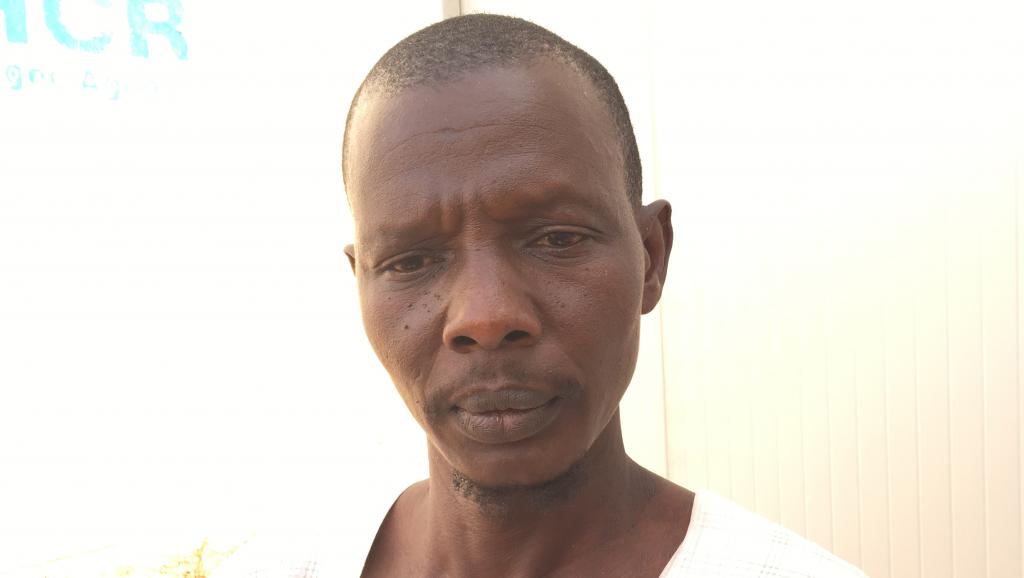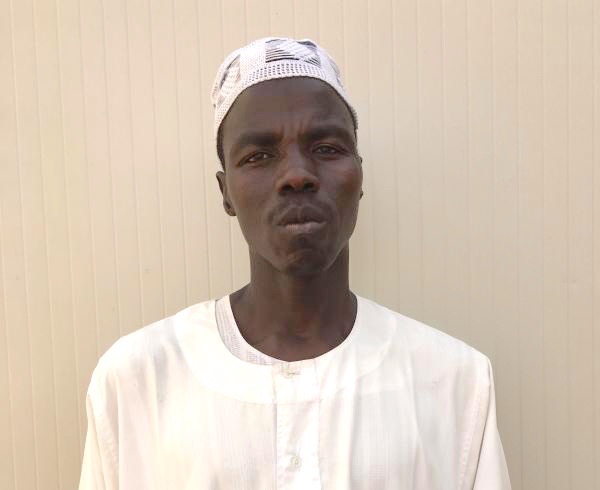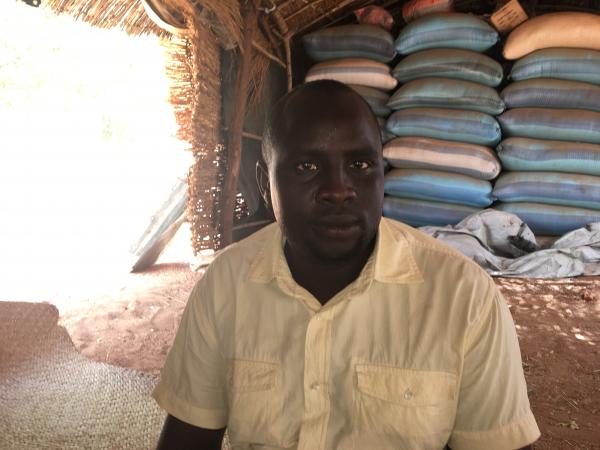[No people in the world are more invisible or more completely abandoned by the international community than the more than 300,000 Darfuri refugees in eastern Chad–ER]
“Tales of slavery and torture for Darfuri refugees in Chad who have nowhere to go”
Radio France International, August 8, 2018
http://en.rfi.fr/africa/20180721-Tales-slavery-torture-Darfuri-refugees-Chad-who-have-nowhere-go
Yahya Juma Haroun, Darfuri refugee, former slave in the mines in northern Chad and Libya | Photograph by L.A. Bagnetto
After languishing 14 years in the safety of a refugee camp, some have risked it all in the hope of making a better life for themselves and their families. Tall, thin, and dressed in a white djellaba, Yahya Juma Haroun, personifies despair. You can see it in his sad eyes, his drooping shoulders and hear it in his raspy voice. Sitting in Djabal camp outside of Goz Beida in eastern Chad, 45-year-old Yahya, a Darfuri refugee, says he went to northern Chad for work to help his two wives and 14 children, so he could pay for their school fees.
“I was with some Chadians and we asked a man to help us. We went north to the gold mines to work to pay back the money we owe him for bringing us there,” says Yahya, who initially left Djabal in 2014.
He worked in the gold mines for a year, the first six months in Kouri-Bogoudi on the border with Libya. The man they were working for did not tell them how much their debt was, nor the wages they had earned. And then things got worse.
“The boss warned us the police were coming, so they took us to the mines in Kalinga, Libya. The Chadian sold us to the Libyans,” he says.
Yahya went with man appointed the leader of the workers to demand their rights and their salaries.
“They didn’t talk to us, they beat us,” he says, adding that he tried to escape after the beating. “But they captured me and beat me again.”
Defeated and broken, he says he did not resist after that. Separated from his family for over a year and having no hope of getting a message to them, he thought he would never see them again. Sudanese and Chadian traders in the area, aware of his plight, decided to help. “The traders saw the state I was in, so they paid off my debt and freed me. I came back home to Djabal camp,” he says.
Yahya’s head, hand and shoulders were injured from the beatings, so he cannot do any heavy lifting. His return empty-handed has also taken a psychological toll. “I said I would go because I wanted to help my family, because I was strong. But after that ordeal and coming back here, I’m very sad. I’m unable to help my family,” he says.
Yahya’s story reflects an increasing number of trafficking cases that are referred to the International Organization on Migration (IOM) by Chadian authorities, says N’Djamena-based IOM Head of Mission Anne Schaefer.
“Authorities are telling us, for example, that youth are potentially being offered an envelope of money for the family,” says Schaefer, explaining that the worker often goes north to work in the gold mines.
“This is without a working contract, so they basically give themselves into the hands of these people, move on, don’t know how long they’ll have to work, or where, or under what conditions, or at what point will they start to earn money for themselves,” she adds.
Mohamed Ahmed Ibrahim, Darfuri refugee and former slave in the gold mines in northern Chad | Photograph by L.A. Bagnetto
Mohamed Ahmed Ibrahim also went to the gold mines in northern Chad but although he was hoping to get a job, he was also looking for his 17-year-old son, who had left six months before. He was also forced into slavery. It is hard to fathom how this could happen, Mohamed says, but it was impossible to resist and there was an ethnic dimension as well.
“We couldn’t fight them, we just had to work. We didn’t have phones so we couldn’t call our families. The police force belongs to the traders, so they wouldn’t protect you,” he says.
He was working with a team digging holes spending some two hours at a time down in the mine. And it was not actually in a remote area.
“We were near a village, with soldiers, but they’re from the same tribe as the traders. And you can’t talk to them they only speak their mother tongue,” says Mohamed, speaking of the times he thought about a possible escape.
One trader sold him to another. Mohamed worked for two years, still desperate to find his son. He and the other slaves on his team demanded to know where their wages were. The trader “had us thrown in prison for 60 days, then he drove us out to a place, where we were given transport money and left.”
He returned to Djabal refugee camp empty-handed, and his son is still somewhere in northern Chad.
A new form of trafficking
These new migration movements up north are dangerous, not only because of the fear of being forced into slavery, but also because there is little mobile phone network coverage, no official or organized transport, and those who do drive are unfamiliar with the area and ill-equipped to fix their vehicles or even carry enough water or avoid the land mines planted in the area, according to the IOM’s Schaefer.
Both men say that they warn everyone in Djabal camp about going to the gold mines in eastern Chad because they both were regularly beaten and are now unable to work doing manual labor.
Mohamed and Yahya’s experiences could be classified as human trafficking, says Schaefer, but “it is different from what we normally classify as entering the trafficking cycle.” She adds that the IOM is conducting more research so that it can understand this new problem.
“The common definition doesn’t seem to do it justice, and it’s quite specific to the phenomenon that’s happening here,” she says, referring to the economic crisis and food insecurity that has gripped the country.
The non-European route
A recent study shows that 80 per cent of sub-Saharan Africans who migrate usually move to another country on the continent. Such is the case for a number of Darfuri refugees – who escaped the 2003 deadly attacks from the Janjaweed, a pro-government Sudanese militia tasked to kill Darfuri – only to feel frustrated, stuck as long-term refugees in eastern Chad.
And although the focus on migration has faced squarely on the Mediterranean route, AbdelRachide Issak Hassane tells a slightly different migrant story. As a university student in Darfur, he fled to Khartoum when the fighting broke out in 2003 so he could continue his studies. But the government crackdown on Darfuri students forced him to go to Egypt.
AbdelRachide Issak Hassane, Darfuri refugee who says he was tortured by Sudanese officials after returning from Israel | Photograph by L.A. Bagnetto
Egypt proved to be a struggle for AbdelRachide although he had a friend with a job there who also went to university, he was unable to find his footing.
“There were 15 of us and we decided to cross the border from Egypt to Israel. We were looking for safety,” says AbdelRachide, sitting in a supply tent in Djabal refugee camp.
While escaping to Israel, Egyptian border police shot six of his friends. He suffered minor injuries, but was able to get away. His injuries proved to be his downfall in Israel. AbdelRachide received a temporary visa but did not have the strength to work in construction in Tel Aviv, which was his only option.
It was a difficult situation, he said, because of the anti-immigrant sentiment, although it was his skin colour, more than his religion, Islam, that upset Israelis. “Some of them are kind,” says AbdelRachide. “But most of them don’t like Darfuri people, or black people. From time to time they held protests and told their government to send us back to our homeland.”
After relying on the kindness of fellow Darfuris who fed and housed him, AbdelRachide asked to be returned to Darfur. The Israelis “said they were willing to send me back, as long as I was asking them to go back to my family,” he says.
He was flown to Egypt and tried to make his way to Darfur on his own, but the Egyptian authorities would not allow him, and insisted in sending him to Khartoum via plane. “When we arrived at the airport in Khartoum, we were stopped,” says AbdelRachide. “The security came, as if they knew us already. They selected us from all the people,” he says, describing how the Darfuri refugees were picked out from other Sudanese refugees travelling back from Egypt. [emphasis added–ER]
He says that they took all his belongings, beginning to cry as he recounts his story.
“The security in Khartoum tortured us badly,” says AbdelRachide, tears rolling down his face. “They put us in ice, in cold water, and they beat us very badly in Khartoum. I can’t tell you all the torture they did to me,” he says. The Sudanese security tortured him over three months, calling him a spy. “They told us we had contact with Israel, Israel is our enemy,” he says. After he was released, AbdelRachide made his way to his family in Djabal refugee camp over the Sudan border in Goz Beida, eastern Chad.
“I came here, looking for safety,” he says.
AbdelRachide lives with his family now; his travels and studies are a thing of the past. His injuries sustained from fleeing to Israel and the subsequent torture in Sudan prevent him from working. And unfortunately, like many others, he is safe in Djabal camp, but just as frustrated with nowhere to go.


